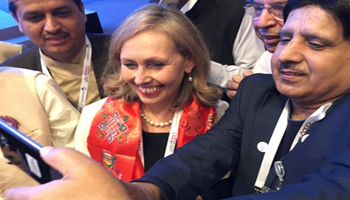By-Anthony Murray
Our international movement entered a new period last week with the election of Monique Leroux as International Co-operative Alliance president.
Pauline Green has been a strong voice for both the British and global movement from meetings with Pope Francis through to representing co-ops at the B20 meetings.
Now Ms Leroux will bring a new era as the Alliance propels itself to the culmination of its 2020 plan. At the Alliance’s biannual global conference in Turkey, over 1,000 delegates came together to discuss the progress of the movement since the Blueprint for a Co-operative Decade was launched in its draft format in 2012.
Identity is clearly an important issue for the co-operative sector to grapple with, especially with the launch of a new global marketing campaign, ‘Co-operatives for a Better World’. This aims to roll out an international awareness project with at least 15 countries next October at the International Summit of Cooperatives in Quebec.
So far, four pilot countries have joined up – Argentina, India, Japan and the United States – who have all developed a video based on the same concept of co-operatives being people-centered businesses.
Ten more countries – with the UK expected to be among them – will join the second stage in January. The plan is to first raise a common awareness among the 250 million people employed within co-operatives, and then for word of mouth to help spread the campaign into the general population.
Through increased awareness of the co-operative business model, it will ensure co-operatives are an option – whether starting up a new organisation or rescuing an established one.
Listening to stories from around the world last week, it’s inspiring to hear how co-ops are making a difference. Stories have included the setting up of prison co-ops, the reclamation of land from the Mafia and co-operatives coming together as a dominant agricultural force.
But co-operatives are regularly undermined, by governments, legislation and policy makers, fighting against corporate competitors. Many speakers in sessions agreed that it’s time co-ops lifted their head above the parapet.
Instead of talking about co-ops needing to operate on a level playing field, some speakers were saying that co-operatives need to be treated much better by governments.
Many global bodies, such as the United Nations, the International Labour Organization and the Food and Agriculture Organization are advocating the co-operative model as the answer to global problems.
When employment is falling, encouraging people to come together and create co-ops is the answer.
But if they could be the answer, why don’t governments treat co-ops better? Jack Wilkinson, a co-operative farmer from Canada, said in a session that governments should actually give tax breaks to co-operatives – or at least farmers that come together. Especially where they are solving global problems.
And this is the message from the new marketing campaign. The time is now right for co-operatives to be mainstream. This couldn’t have been achieved 20 years ago. Now there is a perfect storm. The inequality gap is widening. There is a need for jobs. Individuals have a voice through the internet. And we have a passionate youth wanting change.
Courtsey:ICA
